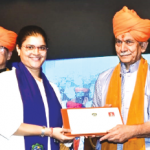Tourism has been playing a decisive role in shaping the economic muscle of the societies and nations. It has assumed a significant role in shaping the policies of the nations to accommodate the aspirations of the people in terms of overall development of the destination area. Tourism is not merely a recreation industry as it used to be in its formative years but it has become a tool that influences the relations between nations in terms of economics and cultural exchange. Economic facet of tourism is well known in terms of the multiplier effect in which financial benefits trickle down to grass root level and its beneficiaries include the last man in the supply chain system. The new dimension of tourism that has captured the imagination of the world is the heritage tourism. The direct derivative of the culture.It is referred to as the cultural tourism or often as cultural heritage tourism .Due to overlapping of the aspects related to the both.Heritage and culture are many times used interchangeably. But the refinement of the definition by the technical intervention of the professional organizations like UNESCO,ICCROM,ICOMOS have delineated both from each other.Interpretation of heritage depends upon the understanding that it is crystallization of culture over the period of time as the representative part of it in time and space. In fact, culture is the core that develops around it the visible landmarks known as heritage .These landmarks are both tangible and intangible. Tangible being the built part in terms of architectural marvels and religious places that include temples, shrines, forts and palaces.The cultural aspect of heritage has made it a multidisciplinary domain that cannot be addressed till other variants are analyzed. These include history, geography, architecture, anthropology, sociology, psychology, religion, philosophy and many other facets that influence the human behavior. Heritage is the time tested of expression of human mind and its interaction that has stood the test of time amid tumult of all kinds.That is why even ruins and archaeological excavations hold great significance in decoding the human past and its journey in continuity to the present.This aspect which is intrinsic to the heritage as the profound representation of cultural moorings of the social groups and communities makes it an ambassador of the cultural moorings across the nations.Many nations in the international domain are using cultural diplomacy to harmonize their relations. Discovering the cultural relations through the exchange of tourists is the new paradigm that has given heritage tourism another advantage to carve its niche as the specialized form tourism.Giving it the status of the geo strategic tool to solve the issue between people by cultural participation in each other’s heritage domain seeking linkages from the past.Heritage tourism is the new barometer of international relations and in country like India where diversity of ethnicity within one cultural space is the hallmark of national consciousness;it gives tourism marketers a mosaic to operate upon in terms of framing strategies for the heritage tourism.The inherent element that makes heritage tourism a delight and challenge both for the tourism marketers and policy makers is the importance of conservation and preservation that shapes its sustainability the prime concern. This aspect makes it handle with care like a product that demands extra vigilance for its marketing.Heritage tourism product needs segmentation and acceptability in the target market for its success as the viable option for the tourists. Thus in devising marketing strategies for heritage tourism; clientele and segment have to be considered with thrust on cultural sensitivities.
Search
Archives
- August 2025
- July 2025
- June 2025
- May 2025
- April 2025
- March 2025
- February 2025
- January 2025
- December 2024
- November 2024
- October 2024
- September 2024
- August 2024
- July 2024
- June 2024
- May 2024
- April 2024
- March 2024
- February 2024
- January 2024
- December 2023
- November 2023
- October 2023
- September 2023
- August 2023
- July 2023
- June 2023
- May 2023
- April 2023
- March 2023
- February 2023
- January 2023
- December 2022
- November 2022
- October 2022
- September 2022
- August 2022
- July 2022
- June 2022
- May 2022
© 2022 Foxiz News Network. Ruby Design Company. All Rights Reserved.







